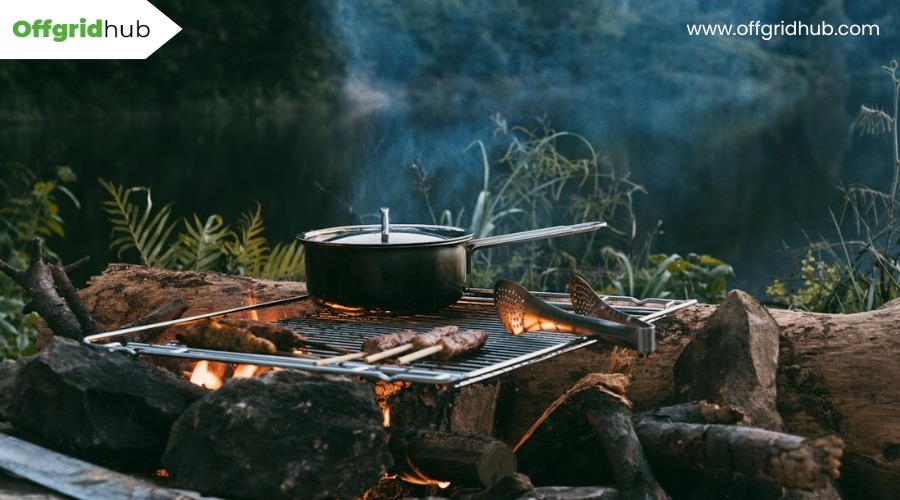Navigating the world of off-grid cooking can feel like charting a course through unexplored territory. You’re faced with an array of options, from the magic of harnessing the sun’s power with solar ovens to the primal satisfaction of cooking over a wood stove.
Each method offers its unique blend of sustainability, reliability, and independence, allowing you to prepare meals without the tether of traditional electricity. But how do you choose the right one for your needs, and what are the secrets to mastering these ancient yet innovative techniques?
Let’s embark on a journey to uncover the essentials of off-grid cooking, ensuring you’re well-equipped for your next adventure.
Solar Oven Basics
Harnessing the power of the sun, solar ovens offer an eco-friendly way to cook food, reaching up to 400°F without the need for fossil fuels. With their reflective panels, they concentrate sunlight to heat up your meals, making them an innovative solution for reducing your carbon footprint. You’re not just cooking; you’re taking a step towards a more sustainable lifestyle.
Using a solar oven means you’ll enjoy a safe cooking environment. There’s no open flame or smoke to worry about, making it a safe option for families and the environment. It’s a hassle-free cooking method that requires minimal supervision. Once you’ve set it up, you can let the sun do its work while you go about your day.
Moreover, solar ovens are perfect for those off-grid adventures or in emergencies where traditional cooking methods aren’t feasible. They provide a sustainable off-grid cooking solution that’s not only user-friendly but also ideal for outdoor activities. Whether you’re camping, hiking, or simply looking to reduce your reliance on traditional energy sources, a solar oven is a versatile and practical choice for eco-conscious cooks.
Dutch Oven Techniques
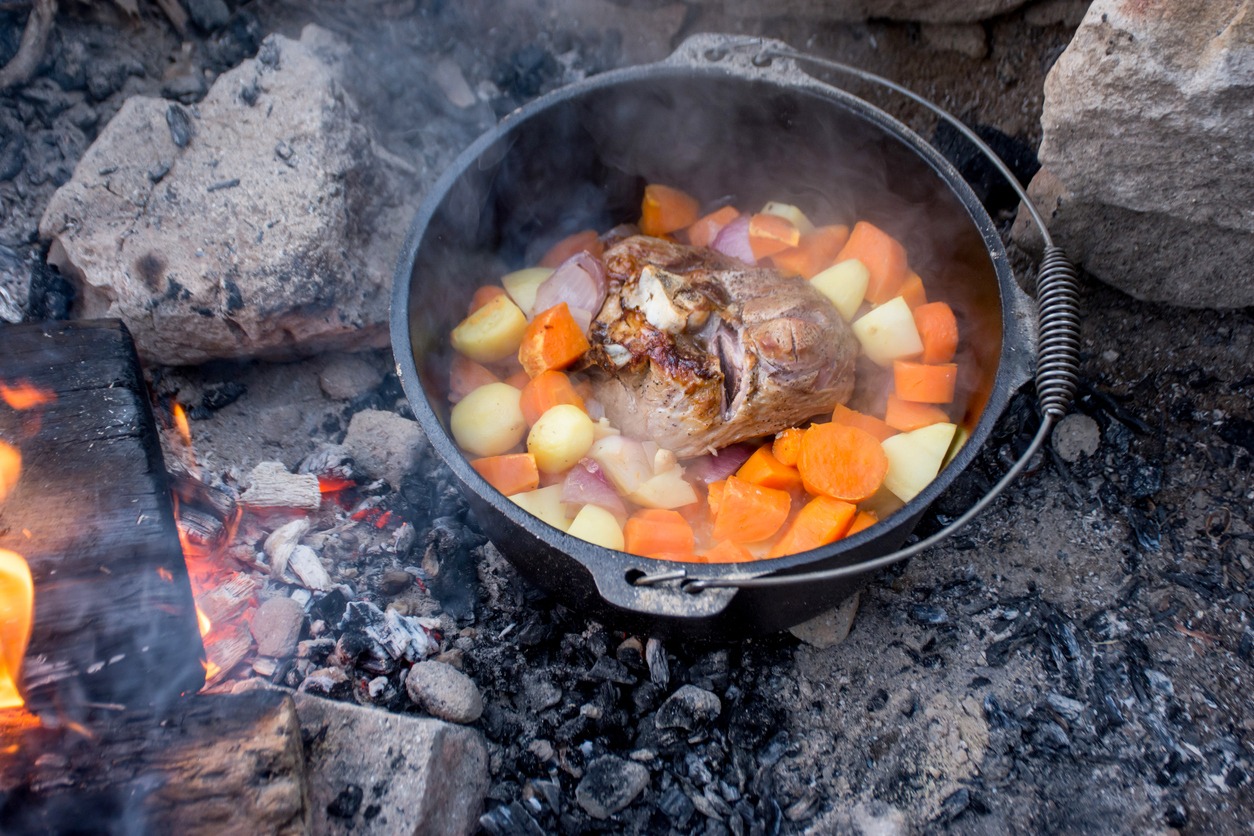
Transitioning to Dutch oven techniques, you’ll discover their unparalleled versatility in off-grid cooking scenarios. These thick-walled pots with snug lids are your best mates when the conveniences of modern kitchens are miles away. Here’s how you can leverage a Dutch Oven in the wilderness:
- Baking: With its ability to distribute heat evenly, your Dutch oven can bake anything from bread to pies over a bed of coals. The tight lid keeps the moisture in, ensuring your baked goods are soft and well-risen.
- Boiling: Whether you’re making a hearty stew or boiling water for purification, the Dutch oven’s capacity and heat retention make it ideal for simmering over an open flame.
- Frying and Roasting: Achieve a crispy exterior on meats or vegetables by utilizing the Dutch oven for frying or roasting. The cast iron’s heat retention creates a perfect searing environment.
- Stewing: Slow cook your ingredients to perfection. The Dutch oven’s lid seals in flavors and moisture, making it perfect for tenderizing tough cuts of meat or melding flavors in a rich stew.
Propane Cooking Insights
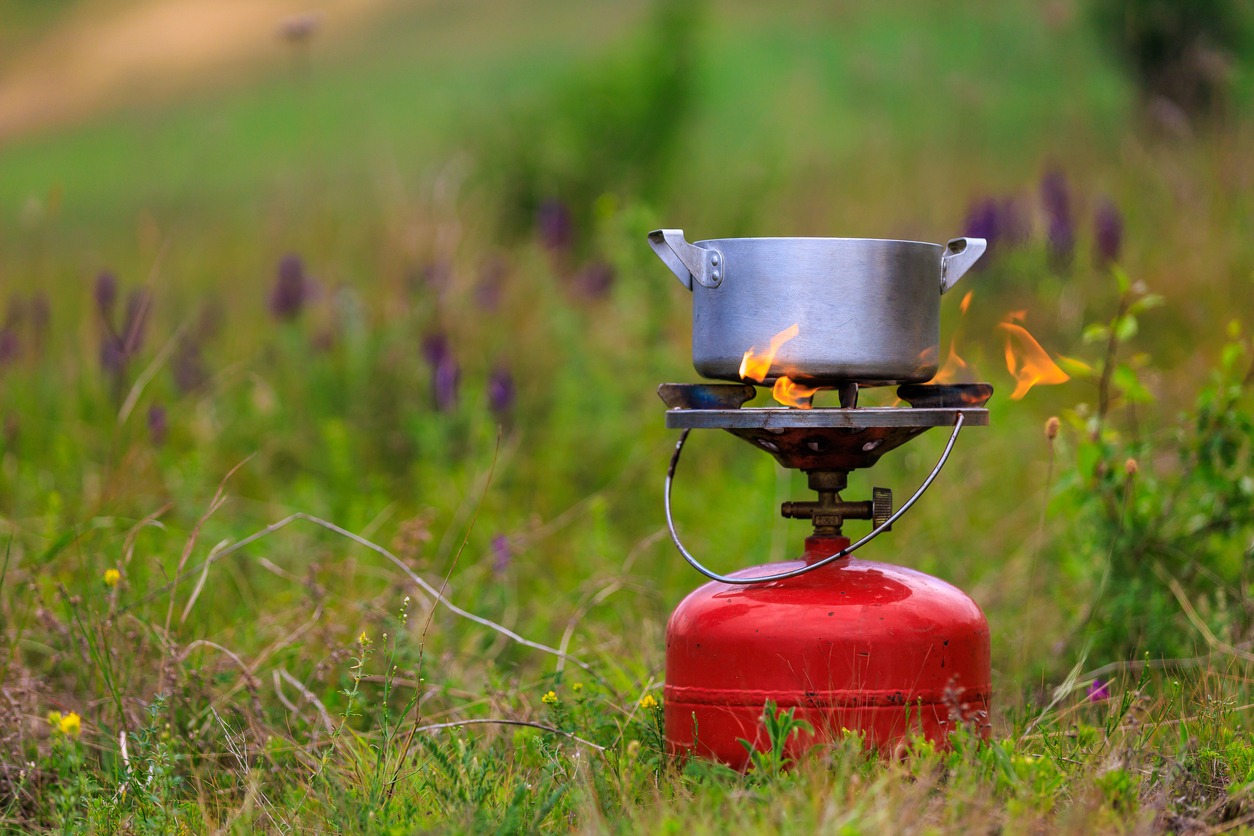
While propane stoves offer a quick and adjustable heat source for off-grid cooking, they may not suit everyone’s environmental preferences. These stoves don’t need electricity to ignite, making them a reliable choice for preparing a variety of foods efficiently when you’re far from the grid. You’ll find that the ability to control the flame instantly allows for precise cooking, whether you’re simmering a stew or searing a steak.
However, it’s worth noting that propane stoves can sometimes impart unpleasant flavors to your food, which might affect the overall taste of your dishes. This is a consideration if you’re particular about achieving the perfect flavor in your off-grid culinary adventures.
Moreover, while they’re convenient, propane stoves fall short in terms of environmental friendliness compared to other off-grid cooking methods. They’re not the greenest choice, which might deter you if sustainability is high on your list of priorities.
Wood Stove Essentials
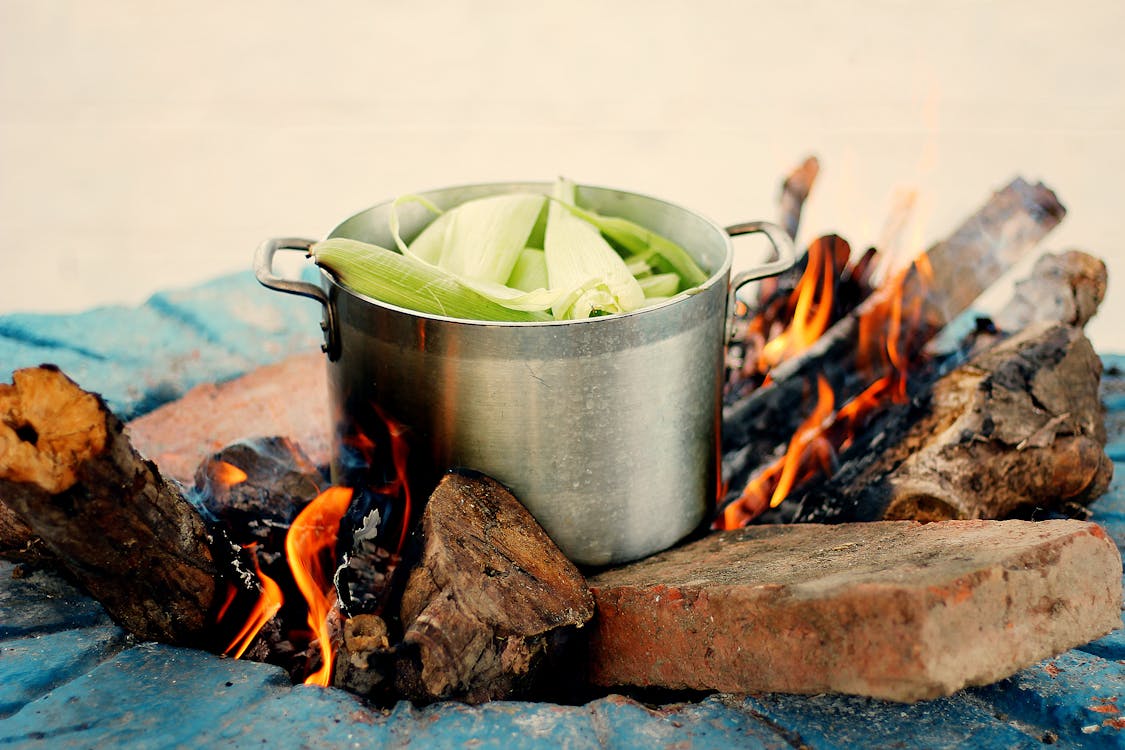
Turning our attention to more sustainable options, let’s explore the essentials of wood stoves, such as rocket stoves, for off-grid cooking. These stoves aren’t only reliable but also use renewable resources, making them a great choice for anyone looking to reduce their environmental impact while still enjoying the comforts of a home-cooked meal.
Here are the key aspects you need to know:
- Efficiency and Environment: Rocket stoves are highly efficient, burning less wood while minimizing smoke emissions. This efficiency means you can achieve high temperatures, often exceeding several hundred degrees Fahrenheit, which is perfect for cooking and boiling water quickly.
- Fuel: Using dry, seasoned wood is crucial. It burns hotter and cleaner, ensuring your stove operates at its best while reducing smoke and preserving air quality.
- Safety and Ventilation: Proper ventilation is a must to avoid carbon monoxide buildup. Always ensure there’s enough airflow and follow safety guidelines to prevent accidents.
- Versatility: Beyond cooking, wood stoves can provide warmth, making them invaluable in colder climates or during the winter months.
Solar Water Heating
Diving into solar water heating, you’ll find that systems like the GoSun Brew can effortlessly heat water to 195°F using just the power of the sun. This marvel of engineering not only supports your off-grid lifestyle but also intertwines seamlessly with your solar cooking adventures. Imagine sipping a hot cup of coffee or having hot water ready for your recipes, all thanks to the sun’s limitless energy. The GoSun Power 550 takes it a notch lower, heating water up to 160°F in under 30 minutes, ensuring you’re not left waiting.
Opting for solar water heaters isn’t just about convenience; it’s a commitment to eco-friendliness. By reducing your carbon footprint, you’re making a choice that benefits the planet. Traditional water heating systems rely heavily on electricity or gas, both of which have significant environmental impacts. In contrast, solar water heating is a beacon of sustainability, drawing power from a renewable source and slashing your utility bills in the process.
Off-Grid Cooking Gear
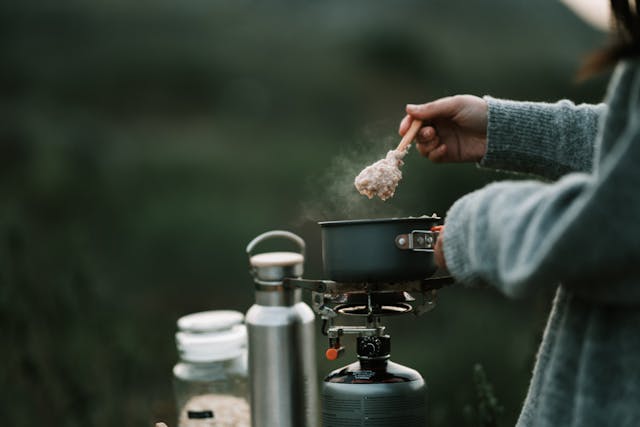
After exploring the benefits of solar water heating, let’s focus on the essential gear you’ll need for off-grid cooking. Whether you’re setting up a campsite or looking to reduce your dependency on traditional energy sources, having the right equipment can make all the difference.
Here’s a snapshot of what you’ll need, powered by the sun and more:
- GoSun Sport Pro Pack: This all-in-one kit includes various cooking accessories designed for solar power use. It offers versatile off-grid cooking options, from baking to boiling, all without the need for conventional fuel.
- Portable Propane Stoves: Perfect for campers, these stoves are compact, easy to set up, and ideal for cooking meals when you’re on the move.
- Solar Water Heaters: With options like the GoSun Brew and GoSun Power 550, you can have access to hot water anywhere, anytime. These are essential for both cooking and cleaning off the grid.
- Solar Fridge Options: The GoSun Chillest Cooler is an example of how you can keep food cold without electricity. It’s a game-changer for preserving your ingredients in remote locations.
With these off-grid cooking gear choices, you’re well on your way to enjoying delicious meals powered by solar energy and other renewable sources.
Food Preservation Tips
How can you ensure your off-grid meals stay fresh and safe over time? The secret lies in effective food preservation, especially when you’re relying on off-grid cooking equipment. One of the best methods is using vacuum-sealed bags or containers, which significantly extend the shelf life of dehydrated foods. But don’t stop there. Store these dehydrated treasures in a cool, dark place to maintain their quality and prevent any spoilage.
Remember to label and date all your dehydrated foods. This simple step helps you keep track of freshness and ensures you’re rotating your stock efficiently. Oxygen absorbers are another game-changer. Tucking them into your storage containers can ward off mold and bacteria, keeping your dehydrated foods safe for longer periods.
Lastly, consider investing in a good vacuum sealer. It might seem like an extra expense at first, but when it comes to long-term preservation of dehydrated foods, it’s an invaluable piece of cooking equipment. With these tips in mind, you’ll master the art of keeping your off-grid meals fresh and safe, ensuring you always have nutritious options at hand, regardless of your location.
Conclusion
You’ve explored a range of off-grid cooking options, from harnessing the sun’s power with solar ovens to the simplicity of Dutch ovens and propane stoves. Wood stoves offer a traditional touch, while solar water heating provides an eco-friendly solution. Equipping yourself with the right gear and knowing how to preserve food can enhance your off-grid cooking experience.
Embrace these techniques to ensure you’re prepared, whether you’re adventuring outdoors or seeking independence from the grid.
